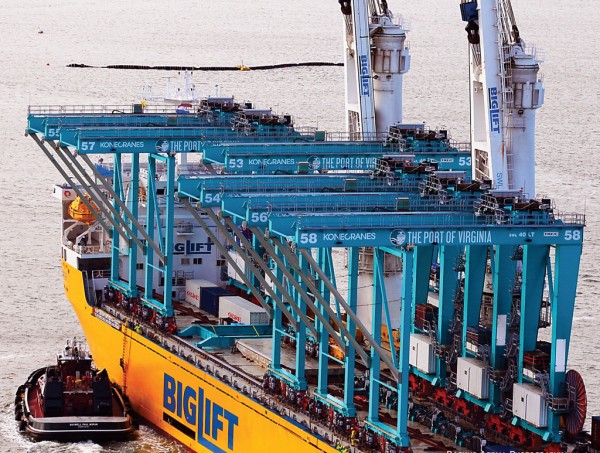Federal grant allows for power-pack and other equipment purchases that will expand reefer capabilities, drive efficiency at the berth
Norfolk, VA – A federal grant is helping The Port of Virginia continue its investment in Richmond Marine Terminal (RMT) to improve cargo handling efficiency and drive more cargo through the growing, upriver barge terminal.

The federal grant will be matched with $47,460 from the port to purchase a large portable generator capable of providing continuous power to multiple refrigerated containers during transit, four large steel bins used for storing equipment used to secure containers and a specialized rack for storing and transporting the steel bins. This equipment, said John F. Reinhart, CEO and executive director of the Virginia Port Authority, will provide a more efficient level of service to current and future customers.
“There is high demand for reefer service to RMT and the addition of this power pack [generator] will enable the port to meet the needs of the cargo owners using the barge,” Reinhart said. “We now have refrigerated capacity on both barges, which is important to the owners of cold cargo and to the growth of our reefer business.
“The storage bins and rack will create greater efficiency during on- and off-loading. It takes about 40 minutes to offload and load the steel bins at each stop and during this time the containers cannot be lifted. The rack will bring everything off at once allowing us to get to work more quickly and provide greater service to the cargo owners. ”
Two years ago a similar power pack was purchased using federal grant money from the Marine Highway Projects grant program and matching money from the port. In 2018, the port received funding under the America’s Marine Highway Program to buy a new – second – barge, called the Richmond Express, to support the service’s growing demand. The second barge allows for the flexibility to increase the number of weekly sailings, based on demand, and a more regular maintenance schedule.
“We are investing at RMT to create efficiency and more opportunities for cargo owners,” Reinhart said. “We are grateful for the federal government’s recognition of the effectiveness of the barge service and the growing importance of RMT in America’s Marine Highway Program.”
In 2019, the thrice-weekly barge service moved more than 37,700 containers, an increase of nearly 20 percent vs. 2018.
The Marine Highway Projects program focuses on expanding existing service on a designated Marine Highway Route that provides new modal choices to shippers of cargo, reduces transportation costs, provides public benefits like reduced air emissions and road maintenance costs and improved safety and resiliency.










